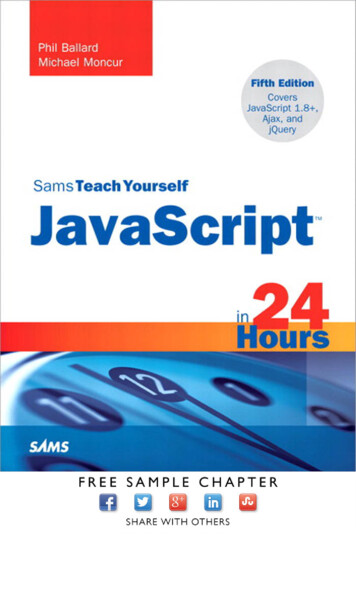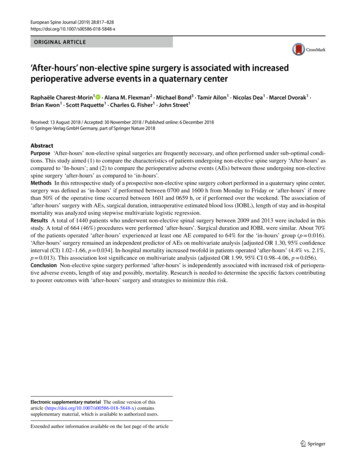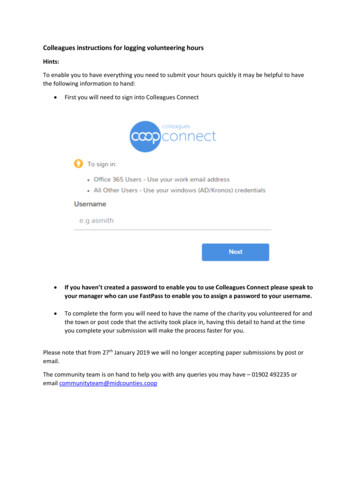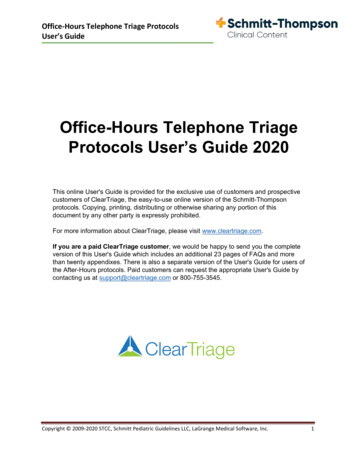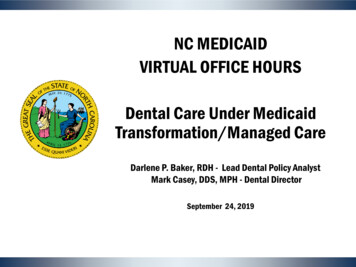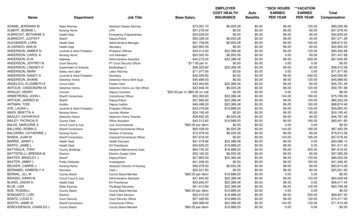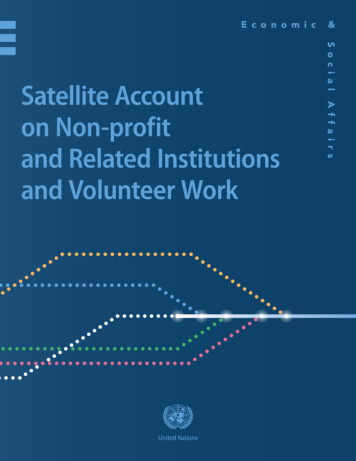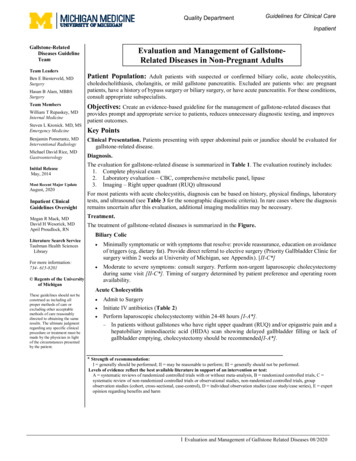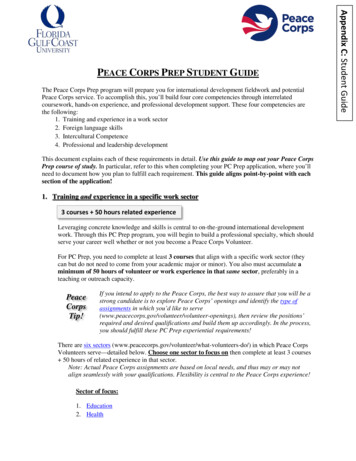
Transcription
The Peace Corps Prep program will prepare you for international development fieldwork and potentialPeace Corps service. To accomplish this, you’ll build four core competencies through interrelatedcoursework, hands-on experience, and professional development support. These four competencies arethe following:1. Training and experience in a work sector2. Foreign language skills3. Intercultural Competence4. Professional and leadership developmentThis document explains each of these requirements in detail. Use this guide to map out your Peace CorpsPrep course of study. In particular, refer to this when completing your PC Prep application, where you’llneed to document how you plan to fulfill each requirement. This guide aligns point-by-point with eachsection of the application!1. Training and experience in a specific work sector3 courses 50 hours related experienceLeveraging concrete knowledge and skills is central to on-the-ground international developmentwork. Through this PC Prep program, you will begin to build a professional specialty, which shouldserve your career well whether or not you become a Peace Corps Volunteer.For PC Prep, you need to complete at least 3 courses that align with a specific work sector (theycan but do not need to come from your academic major or minor). You also must accumulate aminimum of 50 hours of volunteer or work experience in that same sector, preferably in ateaching or outreach capacity.PeaceCorpsTip!If you intend to apply to the Peace Corps, the best way to assure that you will be astrong candidate is to explore Peace Corps’ openings and identify the type ofassignments in which you’d like to ngs), then review the positions’required and desired qualifications and build them up accordingly. In the process,you should fulfill these PC Prep experiential requirements!There are six sectors (www.peacecorps.gov/volunteer/what-volunteers-do/) in which Peace CorpsVolunteers serve—detailed below. Choose one sector to focus on then complete at least 3 courses 50 hours of related experience in that sector.Note: Actual Peace Corps assignments are based on local needs, and thus may or may notalign seamlessly with your qualifications. Flexibility is central to the Peace Corps experience!Sector of focus:1. Education2. HealthAppendix C: Student GuidePEACE CORPS PREP STUDENT GUIDE
3.4.5.6.EnvironmentAgricultureYouth in DevelopmentCommunity Economic Development#1 EducationTeach lessons that last a lifetime. Education is the Peace Corp’s largest program area.Volunteers play an important role in creating links among schools, parents, andcommunities by working in elementary, secondary, and postsecondary schools as math,science, conversational English, and resource teachers or as early grade reading and literacyteacher trainers. Volunteers also develop libraries and technology resource centers.If you choose Education, take 3 courses from one of the following areas:o Engineeringo Early Childhoodo Elementary, Secondaryo Any Physical orEducationor Special EducationBiological Scienceo Matho English or Linguisticso Computer ScienceRecommended courses:o EDF 3253 Learning Mgmt Inclusive Classo EDF 4112 Child Growth and Developmento RED 4310 Early Literacy Learningo TSL 3080 Foundations of ESOo TSL 4520 Sec Lang Acquis Comm& CultureAnd build 50 hours of related field experience through an activity such as: Teaching in one of these or a similar form: in a classroom, with a community outreachorganization, or in a formal tutoring capacityo The subject of the teaching may be English as a Foreign/Second Language, specialeducation, drama, or a STEM subjecto Relevant field/volunteer service opportunities Grace Place for Children and Families: Students will provide English tutoring toadults in the community and mentor elementary-high school students. Guadalupe Center, Inc: Students will tutor kids that are in pre-k-K-2. Life Restoration Community Economic Development Agency: Students will helpwith vocational skills-training for the veterans and low income residents in ourcommunity through job readiness, life skills, and reestablishing self-esteem.#2 HEALTHServe on the front lines of global health. Health Volunteers work within theircommunities to promote important topics such as nutrition, maternal and child health, basichygiene, and water sanitation. Volunteers also work in HIV/AIDS education and preventionprograms to train youth as peer educators, develop appropriate education strategies, provide
support to children orphaned by the pandemic, and create programs that provide emotionaland financial support to families and communities affected by the disease.If you choose Health, take three courses from one of the following areas:o Nursingo Health Educationo Environmental oro Exercise Science oro Pre-medSanitary EngineeringAthletic Trainingo BiologyRecommended courses:o HSC 3243 Teach & Learn in Health Profso HSC 4231 Client Ed in Health Careo NUR 3833 Patient Care Manage in Nursingo NUR 4169 Evidence-Based Nursing Praco NUR 4455 Reproductive Health Nursingo NUR 3355 Child Health Nursingo HSC 2577 Nutri Human Health & Wellnesso HSC 3133 Health and Human Sexualityo HSC 3201 Healthy Communitieso HSC 3131 Health Counselingo HSC 3624 Global Health Systems & IssuesAnd build 50 hours of related field experience through an activity such as: Volunteer or work experience in such areas as HIV/AIDS outreach, hospice, familyplanning counseling, emergency medical technician (EMT) or CPR teaching/certification,maternal health, and hands-on caregiving in a hospital, clinic, or lab technician setting Counseling or teaching in health subjects Working as a resident advisor in a dormitory, as a peer nutritionist, or as a sexuallytransmitted infections counselor Significant experience in mechanical repairs, construction, carpentry, masonry,plumbing, hydrology, or set designo Relevant field/volunteer service opportunities: Blue Zones Project SW Florida: Blue Zones Project is a community-wide wellbeing improvement initiative designed to make the healthy choice the easychoice. Students will help in planning and implementing community events andpresentations. Florida Department of Health: Students have a variety of options throughout theFlorida Department of Health. There are many sections and specialties availablewhen protecting and promoting public health. Clinical and Nutrition Services,Wellness Programs, Community Health Planning and Statistics, EnvironmentalHealth and Engineering, Emergency Preparedness, and Infectious DiseaseServices.#3 EnvironmentHelp forge a global movement to protect our planet. Volunteers lead grassroots effortsin their communities to protect the environment and strengthen understanding ofenvironmental issues. They teach environmental awareness in elementary and secondaryschools and to youth groups and community organizations, empowering communities to3
make their own decisions about how to protect and conserve the local environment.Volunteers also address environmental degradation by promoting sustainable use of naturalresources.If you choose Environment, take three courses from one of the following areas:o Environmental Education o Geologyo Environmental Scienceo Earth and Space Scienceo Marine Scienceor related fieldo Community Planning ando Biologyo Environmentaldevelopmento Climate ChangeEngineeringRecommended courses:o EVR 5414 Interpreting the Environmento EVR 5925 Environmental Educationo EVS 5818 Ecological Risk Assessmento GLY 1000C Physical Geologyo IDS 3920 University ColloquiumAnd build 50 hours of related field experience through an activity such as: Educating the public on environmental or conservation issues, or working onenvironmental campaigns Conducting biological surveys of plants or animals Gardening, farming, nursery management, organic or low-input vegetable production, orlandscaping Providing technical assistance and training in natural resource managemento Relevant field/volunteer service opportunities: Collier County Parks and Recreation: Students will be able to assist withprograms at community center, or with maintenance of landscape at parks Corkscrew Swamp Sanctuary: The majority of activities include exotic plantremoval, brush or debris clearing, or cleaning and maintenance of our extensivefacilities. Students can also arrange for an unpaid internship for a more in-depthexperience. Eco-Voice: Students will assist in advising subscribers of the environmentalevents and issues in South Florida.#4 AgricultureLead grassroots efforts to fight hunger in a changing world. Agricultural Volunteerswork with small-scale farmers and families to increase food security and production andadapt to climate change while promoting environmental conservation practices. Theyintroduce farmers to techniques that prevent soil erosion, reduce the use of harmfulpesticides, and replenish the soil. They work alongside farmers on integrated projects thatoften combine vegetable gardening, livestock management, agroforestry, and nutritioneducation.If you choose Agriculture, take three courses from one of the following areas:o Business or economicso Community Planning ando Biologyo Management orDevelopmento BiotechnologyEntrepreneurshipo Environmental Educationo Climate Change
Recommended courses:o SYD 4603 Community Developmento IDS 3300 Foundations of Civic Engagemento BSC 3303 Biogeographyo BOT 2800 Plants and Societyo EVR 3025 Cultural Ecologyo EVR 4026 Human Ecology and Systemso HUM 2395 Environmental Humanitieso IDS 3332 Issues in Culture and Societyo SPC 3543 Ecological Communicationo IDS 3920 University ColloquiumAnd build 50 hours of related field experience through an activity such as: Working with a large-scale or family-run business involving vegetable gardening,farming, nursery work, tree planting or care, urban forestry, landscaping, livestock careand management, or fish cultivation and production Teaching or tutoring the public in environmental or agricultural issues/activities Working on the business management or marketing side of a commercial farmo Relevant field/volunteer service opportunities: Everglades Wonder Gardens: Students will do basic gardening such as raking,watering, clearing large branches and limbs from grounds, cleaning exhibitwindows, washing picnic tables. FGCU Food Forest: Students will help with general garden maintenance: pullingweeds, watering plants, trimming, mulching and planting.#5 Youth in DevelopmentEmpower the next generation of change makers. Volunteers work with youth incommunities on projects that promote engagement and active citizenship, including genderawareness, employability, health and HIV/AIDS education, environmental awareness,sporting programs, and info technology.If you choose Youth in Development, take three courses from one of the following areas:o Environmental Educationo Counselingo Social Worko Community Planning ando Community Healtho Early ChildhoodDevelopmento PsychologyDevelopmento Health Scienceo Child and Youth StudiesRecommended courses:o EDF 4112 Child Growth and Developmento EEC 3268 Play Development & Assessmento EEC 4307 Cognitive Exp for Yng Childreno EEX 4201 Young Children with Spec Needso TSL 3080 Foundations of ESOLo TSL 4520 Sec Lang Acquis Comm& Cultureo RED 4344 Methods of Teaching Readingo IDS 3920 University Colloquium
And build 50 hours of related field experience through an activity such as: Teaching or counseling in at-risk youth programs Activities that involve planning, organizing, assessing community needs, counseling, andleadership, in areas such as education, youth development, health and HIV/AIDS, theenvironment, and/or businesso Relevant field/volunteer service opportunities: FGCU College Reach Out Program: Students may serve as tutors, mentors,and/or guest speakers during after-school programs held at middle and highschools throughout the five-county area. Blue Crayonz Inc: Students will learn more about Autism Spectrum Disorderwhile helping spread Awareness in our community while building a communitysupport system. Boys and Girls Clubs of Lee County: Students will maintain a fun atmospherewhile providing core programs for Academic Success, Health and Life Skills,and Technological Skills to youth in the community.#6 Community Economic DevelopmentHarness 21st-century tools to help communities lift themselves. Volunteers work withdevelopment banks, nongovernmental organizations, and municipalities to strengtheninfrastructure and encourage economic opportunities in communities. They frequentlyteach in classroom settings and work with entrepreneurs and business owners to developand market their products. Some Volunteers also teach basic computer skills and helpcommunities take advantage of technologies such as e-commerce, distance learning, andmore.If you choose Community Economic Dev., take three courses from one of the following areas:o Global Studieso Computer Informationo Business or Publico Supply ChainSystemsAdministrationManagemento Digital Media Designo Accounting, Banking oro Entrepreneurshipo CommunicationsFinanceo International Businesso Computer ScienceRecommended courses:o MAN 3025 Principles of Managemento ECO 3703 International Economicso ECP 3302 Economics of the Environmento ECS 4013 Economic Developmento ENT 2000 Intro to Entrepreneurshipo ENT 2010 Principles of Entrepreneurshipo MAN 3781 Sustainable Businesso MAN 4602 Global Business Strategy & Organizationo ENT 3503 Social Entrepreneurshipo ENT 3618 Technology & InnovationAnd build 50 hours of related field experience through an activity such as: Working with businesses, organizations, or cooperatives in accounting, finance,microfinance, management, project management, budgeting, or marketing Starting and running your own business or other entrepreneurial activity
oPeaceCorpsTip!Training others in computer literacy, maintenance, and repairWebsite design or online marketingFounding or leading a community- or school-based organizationRelevant field/volunteer service opportunities: Hope for Haiti: Students will help with marketing strategies to increase the scopeof social business to support economic development in rural Haiti. Immokalee Foundation: TIF is home to programs that enhance the lives ofImmokalee’s next generation by emphasizing education, vocation, and life skillsthat build pathways to success. There are opportunities for Business, Technology,Philanthropic, Graphic Design, Teaching, Counseling, ComputerSoftware/Database Operation, and Special Event Management.Nearly two-thirds of Peace Corps Volunteers serve in Education or Health.Coursework and meaningful experience in one of these areas—especially teachingEnglish as a second/foreign language—produce some of the strongest candidates.2. Foreign language skillsRequirements vary by placement regionMost students must hone their capacity to interact professionally using a non-English language.Minimum course requirements vary by desired placement region. Latin America: Students indicating an intention to serve in Spanish-speaking countries must buildstrong intermediate proficiency, having completed two 200-level courses or learned Spanishthrough another medium. West Africa: Students indicating an intention to serve in French-speaking African countries mustbuild proficiency in French or another Romance language, having completed one 200-levelcourse or learned the language through another medium. Everywhere else: Students indicating an intention to serve anywhere else do not have explicitlanguage requirements to complete the Program, but they should still be encouraged to study aforeign language.Note: If you are a strong native speaker and hope to serve in a country that speaks your samelanguage, you can skip this requirement!3. Intercultural competence3 approved courses or 1-2 courses substantive intercultural experienceEngaging thoughtfully and fluidly across cultures begins with one’s own self-awareness. With thislearning objective, you will deepen your cultural agility through a mix of three introspectivecourses in which you learn about others while reflecting upon your own self in relation to others.The goal is for you to build your capacity to shift perspective and behavior around relevant culturaldifferences. Some example courses:Note to Universities completing the Invitation to Participate: This learning objective aims toprepare students for the on-the-ground, human-to-human, intercultural realities inherent to PeaceCorps service. It provides a space for universities to highlight relevant curricular options as well as
experiential opportunities, such as service learning, study abroad, or alternative spring/fall breakprograms they have that address the learning objective.For this competency, we require that all students take three courses: one core course inDiversity and Inclusion and two relevant electives. If a PC Prep program would like to, they maygive their students the option of engaging in substantive intercultural experiences in place of one orboth electives. The core course(s) should be an introspective Diversity and Inclusion offering that helpsstudents increase cultural self- and other-understanding, building their adaptabilityaround relevant cultural differences. Examples would be Intercultural Communication,Multicultural Counseling, or courses that integrate self-reflection into the study ofmarginalized groups (i.e., classes focused on race, gender, sexuality, or disabilities).Alternatively, some PC Prep partner universities have created a specialized “GlobalService” course to fulfill this requirement. Electives: To fill out this competency, programs may require that students take two morecourses of the above type or more globally-oriented classes such as InternationalDevelopment, area studies (i.e., African Studies, Latin American Studies, etc.), theEconomics of Poverty, Peace Studies, Cultural Anthropology, Emerging Markets, WorldLiterature, etc. Optional: Intercultural experience in place of elective(s). If you would like to giveyour students the option of substituting intercultural experiences for one or both electives,here are the guidelines:o Studying or volunteering abroad may count if the student is in a country thathas at some point hosted Peace Corps Volunteers (see the list of current and pastcountries here [www.peacecorps.gov/countries]). Studying/volunteering abroad in these countries from one week to asummer may substitute for one course. Experiences that last a full semester may substitute for both electives.o Other intercultural experiences, such as helping new immigrants/refugeesacculturate to the U.S. or volunteering in diverse schools, may also count. Feelencouraged to highlight relevant opportunities here. If they also align with one ofPeace Corps’ six sectors, these experiences may simultaneously count for thathands-on experiential requirement. Each distinct intercultural experience lasting at least forty hours maysubstitute for one elective.Please include here an initial list of your own approved courses offered in your catalog. The listmay be as short or long as you desire, and may evolve with time. If you are allowing interculturalexperiences to count for credits, please include appropriate language below.You’ll take at least 1 of these core courses: INR 3003 Theories of INR 2015 Global StudiesInternational Relations SYG 2012 Global Sociology SYG 2010 Social Problems SYD 4020 Global Population LIT 4353 Ethnic StudiesAnd choose 2 additional electives from the above list or these below: CPO 3303 Latin Amer. Politics & AFH 3100 African History toSociety1850 CPO 3403 Politics of the Middle ASH 3404 Modern ChinaEast ASH 3550 Post Colonial India
CPO 3760 Religion and PoliticsLAH 3200 Modern Latin AmericaLAH 3470 History of theCaribbeanLAH 3724 Race and LatinAmerica *Students could count as anelective a study abroad program
This document explains each of these requirements in detail. Use this guide to map out your Peace Corps Prep course of study. In particular, refer to this when completing your PC Prep application, where you’ll need to document how you plan to fulfill each requirement. This guide align
